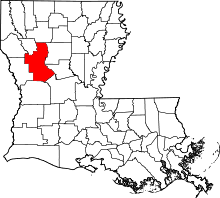Grand Ecore, Louisiana
| Grand Ecore | |
|---|---|
| Unincorporated community | |
 Grand Ecore Location within the state of Louisiana | |
| Coordinates: 31°48′57″N 93°5′6″W / 31.81583°N 93.08500°WCoordinates: 31°48′57″N 93°5′6″W / 31.81583°N 93.08500°W | |
| Country |
|
| State |
|
| Parish |
|
| Time zone | Central (CST) (UTC-6) |
| • Summer (DST) | CDT (UTC-5) |
| GNIS feature ID | 535334[1] |
Grand Ecore is a Populated place on the Red River in Natchitoches Parish, Louisiana, United States. It is located approximately eight miles north of Natchitoches and west of Clarence.
The community is part of the Natchitoches Micropolitan Statistical Area.
Bernhard Müller, a leader of a Utopian religious commune, died at this location of yellow fever in 1834. His group went on to establish what is now known as Germantown Colony, located northeast of Minden in Webster Parish.[2]
Grand Ecore, known for a distinctive bluff on the river, figured in the Red River Campaign of the American Civil War. There the Union decided to retreat to New Orleans after sustaining weeks of defeats along the river. "Ecore" is the French word for "bluff".
Historian John D. Winters in The Civil War in Louisiana (1963) claims that Union General Nathaniel P. Banks "failed to make a proper reconnaissance to find a river road that would give him naval protection. Instead he struck out inland [westward] and moved into Taylor's trap at Sabine Crossroads. The long interior march through the pine barrens had necessitated long supply trains."[3] Winters maintains that Banks should not have retreated from Sabine Crossroad and the Battle of Pleasant Hill thereafter but could have taken advantage of Taylor's weakened forces and moved northward to invade the Confederate stronghold of Shreveport.[4]
References
- ↑ "Grand Ecore". Geographic Names Information System. United States Geological Survey.
- ↑ David James, III, "Germantown: Once Thriving and Socialistic", Minden Press, July 7, 1958, pp. 1-2
- ↑ John D. Winters, The Civil War in Louisiana, Baton Rouge: Louisiana State University Press, 1963, ISBN 0-8071-0834-0, p. 378
- ↑ Winters, pp. 378-379
| |||||||||||||||||||||||||||||||||
